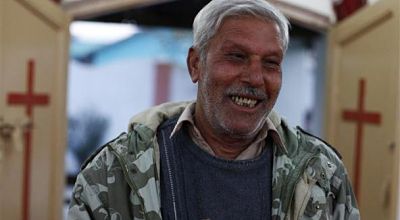This Christmas, pastor Nazir Alam stoked up a fire, laid a fresh cloth on the altar and welcomed parishioners as they arrive at his church in Waziristan, a Pakistani tribal area known as an al-Qaeda haven.
“The lights are all up, and the choir boys are ready. The church is looking its best,” said 60-year-old Alam, a former missionary who has celebrated his last 10 Christmases there. “There’s not much left to do but to pray and rejoice.”
Outsiders might see little cause for joy. Pakistan is the sixth most dangerous country in the world for minorities, says London-based watchdog Minority Rights Group International. Christians, Shiite Muslims and Ahmadis are victims of a rising tide of deadly attacks.
But Alam’s church, and the homes of most of his 200 parishioners, are nestled inside a Pakistani army base in South Waziristan, a mountainous region that was a hotbed of militancy until a military offensive in 2009.
“When the U.S. went into Kabul, things became bad for everyone. But we are safe here. The army protects us,” says Shaan Masih, who helps clean the church and likes to play the drums and sing carols.
For two decades, the church was little more than a room and the tiny community worshipped there under light protection. In 2009, the army set up a base in South Waziristan as part of the offensive against the insurgency and invited the church inside.
“It was a longstanding demand of the community to be given a proper space,” Col. Atif Ali, a military officer, told Reuters during a rare trip to the region arranged by the military.
Many of the Christians work for the army in clerical or domestic positions. So far, they have been sheltered from the bombings, raids and drone strikes, violence that rocks the region on an almost daily basis.
Less than a 100 miles away lies North Waziristan on the border with Afghanistan and one of the last areas controlled by the Pakistani Taliban.
The United States has repeatedly urged Pakistan to launch an operation against militants sheltered there including remnants of al-Qaeda and Pakistani groups targeting the nation’s minorities.
Pakistan says it is doing everything it can to fight the militancy and needs to consolidate the campaign in South Waziristan before opening a new front.
Freshly Painted
The small blue and white church building has been freshly painted and the main hall covered in new ceramic tiles. A small chandelier hangs from the ceiling and a cloth spread over the altar reads: “So if the Son sets you free, you will be free indeed.”
The church’s gratitude to the army is expressed in a sign outside thanking Ali for his help with the renovation.
“Now it is much easier and convenient for them to worship. The new building is close to their homes. They are very happy with us,” he said.
While Christians elsewhere in the country are lowering their profile, community members here mix freely with their Muslim neighbors. Their children attend the same schools and neighbors go to each others’ weddings and funerals.
When five Christians from Waziristan were kidnapped by the Taliban on their way to the plains of Punjab in 2009, pressure from the army and the community helped free them.
“There are lots of Muslims in our neighborhood,” said 30-year-old Saleem Masih, another church helper. “We take part in each other’s happiness and sorrow. Christmas is coming. You’ll see the Muslims will join us.”
Relations between Pakistan’s Christians and Muslims are not always so harmonious. Rimsha Masih, a teenage Christian girl, was accused of blasphemy in Islamabad earlier this year in a case that underlined the climate of fear and suspicion that minorities face.
Masih was eventually cleared of the charges, but many of her neighbors fled their homes and her family is still in hiding. Nine Christians were killed after a similar accusation in 2009 and mobs frequently lynch anyone accused of blasphemy before they can get to court.
That’s one reason why Christians in South Waziristan say they feel safer in their army base than living in Pakistan’s capital, where they are vulnerable to accusations from anyone who covets their homes or businesses.
But the main reason, says pastor Alam, is their trust in their neighbors, ordinary Muslims who are also living under the shadow of war.
“If there is one person who kills, there are also so many who protect. We couldn’t live here if Muslims didn’t give us protection,” said Alam.
“Don’t forget: where there is bad, there is always good also.”
Editing by Katharine Houreld and Sanjeev Miglani
© Thomson Reuters 2012 All rights reserved.
See an error in this article?
To contact us or to submit an article






















